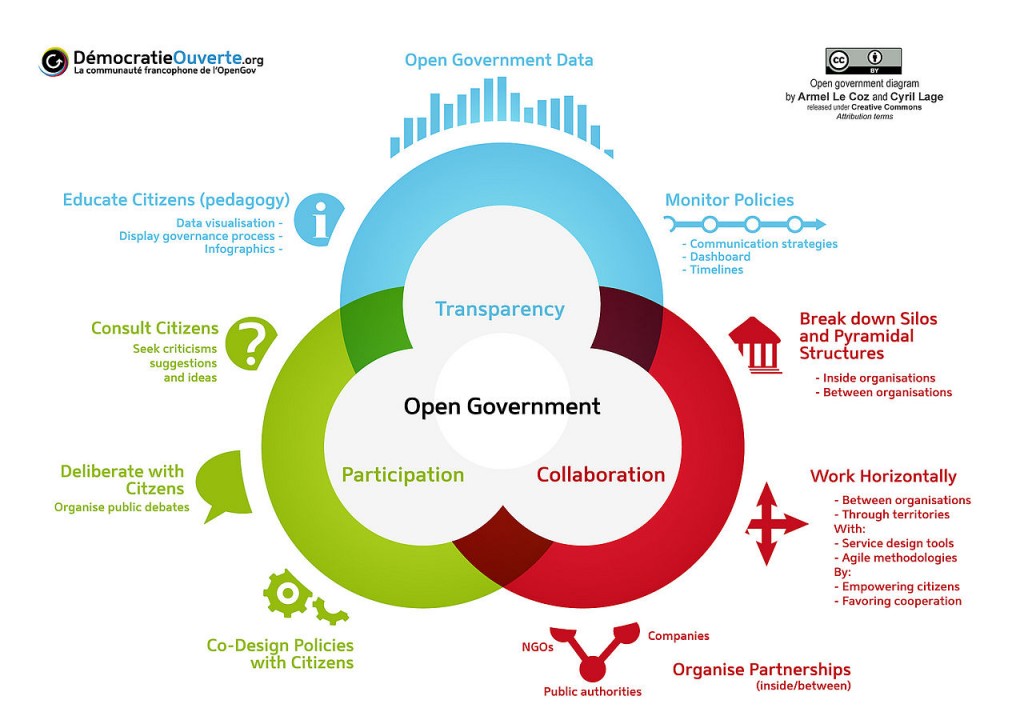
Although the concept of open government dated to several decades before, it is now, with digital world revolution, when open government development is being facilitated. Citizens demand a more active role in political life, which is leading governments to transform democratic systems, based on 3 principles: transparency, collaboration and participation, as the following figure shows:

In order to make these three pillars come true, institutions are opening new channels of dialogue, where administrations and society communicate bilaterally and work together for the benefit of everyone. And open data is necessary for this effective collaboration.
The access and reuse of public information is essential to achieve an open government. The objective of these principles are:
- Access to public information seeks to empower citizens, making it easier for them to know what actions are taking place in order to judge public entities activities.
- The reuse of information aims to ensure that citizens, often through business associations, use this public information to create new services and products to add value to society and improve economic activity.
Both concepts are related, but the different visions require different legal frameworks. In this context, the Spanish legal system contemplates two laws: the Law of Access to Information and the Law of Reuse of Public Sector Information.
THE REGULATION OF ACCESS TO INFORMATIONIn Spain, access to information is regulated by Law 19/2013, of December 9, on transparency, access to public information and good governance. This law establishes a series of obligations regarding the publication of public information that allows citizens to know how administrations make decisions that affect them. Information that should be shared include the distribution of public funds, the functions of the different authorities or their performance criteria, among other information.
This information must be shared in the most comprehensible way: using quality, clear and simple data that are updated periodically and universally accessible (that is, accessible to people with disabilities), among other characteristics.
This law is mandatory for the General Administration of the State, Autonomous Region and Cities and local administrations, as well as some authorities indicated in the legislative text, such as the Royal House, the Constitutional Court or the Central Bank, among others.
REGULATION OF REUSE
On the other hand, the reuse of public information is regulated by Law 37/2007, of November 16, on the reuse of public sector information, which was adapted by Law 18/2015, of July 9, to include European Union´s regulatory changes (Directive 2013/37 / EU). This law address the need to process and publish information taking into account conditions that facilitate reuse: structured, open and interoperable formats that guarantee security, as well as intellectual and industrial property. The data should be complete, reliable and quality.
Data shared by public authorities to be reused are very diverse in nature, from social or economic data to geographic or statistical information. These data can be used to create, for example, applications, whether commercial or not, to help doctors to treat their patients, farmers to effectively manage their farms, or citizens to know where free internet access points are.
This law affects public sector administrations and organizations at all levels, including social security management entities or state agencies, among other agencies.
In conclusion, for an effective open government, it is necessary for citizens to have access to information easy to understand, but also easy to reuse. Open data not only have to be accessible, but, through its reuse, they also have to give the possibility to citizens and companies to be an active part of the community, and create new products and services that can help the whole of the society.
Crear sistemas de acceso a la información para diferentes sectores de la sociedad, adaptándolos.